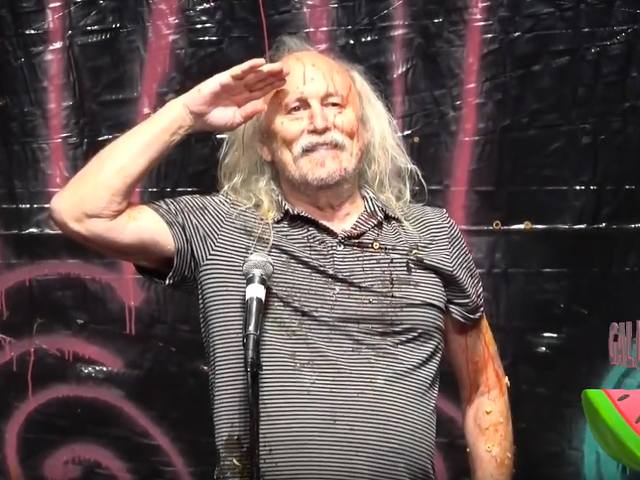Longtime CityBeat film critic tt stern-enzi is currently in the midst of covering the Toronto International Film Festival. As he wrote in a preview piece of the fest, it's a day he anticipates as if it were the "highest of holidays" — his "birthday and Christmas morning, all rolled into one glorious gift."
Running from Sept. 5-15, the lineup includes a slew of films — from Terrence Malick's A Hidden Place to Todd Phillips' Joker and Robert Eggers' The Lighthouse. As the festival goes on, tt is keeping a daily log of his experiences via his blog terrencetodd.com. Here's a few excerpts (edited for brevity) from each post over the weekend.
Day One
I am a critic eager to engage my curious and high subjective sensibilities. I want to feel enraptured by a filmmaker willing to woo me, and if they have been successful before, I’m more likely to give them more chances to do it again — even if the subsequent attempts fall short. I suppose it’s like love. If I loved you once, I’ll always love you.
That might explain my choice to kick off #TIFF2019. I settled in with A Hidden Life, the new film from Terrence Malick, a director that I, like most critics, have a certain history with that clouds my judgment about his work. A Hidden Life reveals the Malick I’ve been waiting ever-so patiently for all these years. He continues to let his characters speak in voiceovers and bathes us with lush visuals, but there is a perfect union here that’s been missing since his first films. I would argue that Malick has found a subject and a narrative that has engaged him and his artistic sensibilities like never before.
The narrative, which Malick wrote, is based on a true story of the experiences of Franz Jägerstätter (August Diehl), an Austrian farmer and family man who is put to the test when he’s drafted to serve in the Nazi army. At first, he goes for basic training and writes back to his wife Franziska (Valerie Pachner) of his time there. But we see him questioning the ideological bending exacted on his fellow trainees and his resistance. He longs to be away, back working on the land, contributing to the well-being of his community and playing games with his wife and daughters.
But when he returns from training, his home is different. The elders of the village have been seduced by Nazi propaganda — fearing the rise of Others, intent on replacing natural-born citizens and bastardizing the land and country. There is a subtlety to Malick’s writing and execution that lets these arguments, largely spoken as direct dialogue rather than in voiceover, address our current political environment without capturing the sentiments and the parallels in bold highlights.
For the full recap, click here.
\\<\/iframe\>
Day Two
In theory, I love the TIFF Rising Stars initiative. I can’t say that I’ve invested a significant portion of my coverage time to it in the past, but its focus on new Canadian and international talent and its efforts to mentor and provide performers with public exposure deserves attention.
This year’s bountiful crop of talent captured my eye, in large part due to the inclusion of Kelvin Harrison Jr., an actor who had already garnered industry notice in 2017 when Filmmaker Magazine recognized him as one of the "25 New Faces in Independent Film."
I caught Waves, the new film from Trey Edward Shults (Krishna, It Comes At Night) in part because of Harrison, but largely out of curiosity, since the critical buzz has been unavoidable. At this time of the year, certain titles have obvious cache — A Beautiful Day in the Neighborhood or The Irishman, to name a couple — while others build word of mouth after festival screenings. Waves falls in that latter category.
Shults presents audiences with an all-American family, striving on the back of their rising son Tyler (Harrison), a high school wrestler and hardworking student with a beautiful girlfriend and a bright future. His father (Sterling K. Brown) is a domineering taskmaster, preparing his son to be better than the world he’s about to enter, while his mother (Renée Elise Goldsberry) offers gentle support to offset some of the tough love. His younger sister Emily (Taylor Russell) lingers on the margins of the family’s attention.
We know we’re bearing witness to a tragedy, the breaking of this unit, but Shults takes his time building them up. We need to see them because, as an African-American family, they might not be what we would expect.
My second Rising Star of the day was Josefine Frida Pettersen, the lead of writer-director Jorunn Myklebust Syversen’s Disco, which I added to my schedule on a whim. The story of a championship level dancer (Pettersen) whose status in competition starts to falter, causing her religious family to question her faith, didn’t quite make sense. Somehow disco dancing and an exploration of modern Christianity seemed at odds. And Disco does shy away from either side of this dynamic.
For the full recap, click here.
\\<\/iframe\>
Day Three
Late on day two, I accepted an invitation to attend a screening of The Report, from writer-director Scott Z. Burns. The Report has the highly-in-demand Adam Driver commanding the screen as the former intelligence officer turned Senate investigator who worked on and drafted the Senate Intelligence Committee report on Enhanced Interrogation Techniques (or torture, to put it more bluntly).
But Burns and Driver are taking a backseat here to Annette Bening, who appears in The Report as Senator Dianne Feinstein, the chair of the intelligence committee at the time the report was commissioned. For those who pay attention to the news, Feinstein is a familiar face and presence from the Sunday morning circuit. A fiery liberal debater with a willingness to compromise to get bills passed, Feinstein could have been a presidential contender, given the right circumstances.
Bening doesn’t exactly favor Feinstein, but from the moment she first appears onscreen, she is without a doubt THE Dianne Feinstein. Her bearing and steely intelligence syncs up perfectly with Feinstein’s, plus there’s Bening’s outspokenness on politics that lends even greater credence to the views she’s espousing.
For the full recap, click here.
\\<\/iframe\>






